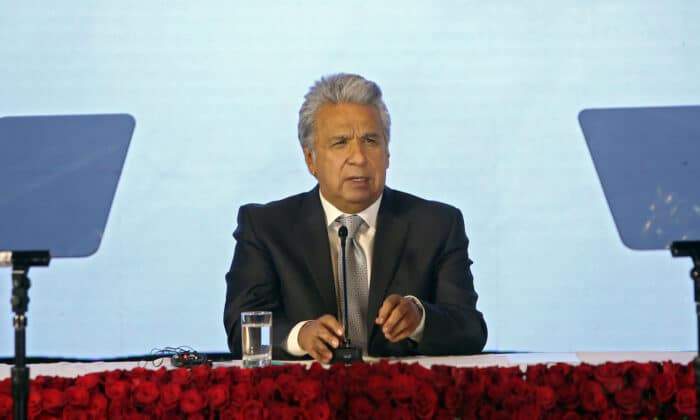Spotlight on America: US Saves Ecuador From China’s Debt Trap

The United States struck a deal with Ecuador to refinance its China debt, as part of an effort to counter Beijing’s growing influence in Latin America.
The U.S. International Development Finance Corporation (DFC) signed a framework agreement with the government of Ecuador on Jan. 14 to refinance its preexisting debt to China and support the country’s development projects in the future.
DFC is a federal government agency formed in December 2019 to advance U.S. foreign policy interests and finance infrastructure projects in developing countries to compete with China.
“The agreement is for the delivery of up to $3.5 billion to prepay expensive debt and reactivate the productive sector,” President Lenín Moreno of Ecuador said during a virtual press conference after the signing of the agreement.
As part of the deal, Ecuador agreed to join the “Clean Network” to remove Chinese companies from its telecommunications infrastructure.
Last year, the State Department launched a campaign called Clean Network to boot Huawei and other Chinese telcos from fifth-generation (5G) wireless networks around the world. So far, about 60 countries, representing more than two-thirds of the world’s economy, and 200 telecom companies have joined the alliance.
“This framework agreement allows DFC to streamline support for projects that refinance predatory Chinese debt and help Ecuador improve the value of its strategic assets,” DFC’s CEO Adam Boehler said in a statement on Jan. 14.
“We are proud to collaborate with Ecuador to advance this critical and strategic project with an important ally of the United States in the Western Hemisphere.”
There has been a dramatic growth in trade and investment relations between China and Latin America in the past decade.
After the 2008 global financial crisis, China approached many Latin American governments with offers to build and finance infrastructure projects in exchange for breaking with the United States. Many countries agreed, and are now saddled with high-interest Chinese loans.
In recent years, Chinese technology giants have also increased their footprint in the region.
“Chinese companies such as Huawei, Xiaomi, Alibaba, and BYD are rapidly expanding in Latin America and the Caribbean, and Chinese giant Tencent is becoming an emerging source of finance for local startups,” a report by Council on Foreign Relations stated on Jan. 19.
Beijing is also trying to increase its influence over public opinion by cooperating with local media outlets that insert Beijing’s narrative organically into their content, the report stated.
Ecuador was scrambling to pay back its loans worth $19 billion from China for the construction of a controversial dam as well as for bridges, highways, irrigation, and other projects, The New York Times reported in 2018.
Despite perilous amounts of debt, Ecuador also joined China’s Belt and Road Initiative (BRI) in December 2018. The country immediately borrowed another $900 million from China and received more than $69 million for reconstruction and $30 million in nonrefundable assistance.
In recent years, China has lured many countries into a debt trap through the BRI, which is one of the world’s most ambitious and controversial development programs. Since its launch in 2013, the BRI has poured billions of dollars into emerging countries to help build massive infrastructure projects. So far, 18 countries in Latin America and the Caribbean have joined the BRI.
Beijing plans to double bilateral trade with South American countries to $500 billion by 2025 and to increase BRI investments into the region to $250 billion.
Last year, Washington criticized Beijing for exploiting the pandemic to further expand its geopolitical influence through predatory lending practices.
Most of the BRI projects are financed through Chinese state-controlled lenders with a lack of transparency, leaving borrowing nations distressed by massive debt burdens. In recent years, Beijing has come under fire for setting a “debt trap” to seize control of strategic assets in emerging countries.
Boehler described the deal as a “novel model” to remove China from South American countries.
Under the agreement, the DFC will partner with other private financial institutions to help create a special purchase vehicle that will acquire oil and infrastructure assets from the Ecuadorian government. With the proceeds, the government will pay off the debt to China earlier than previously agreed, according to Financial Times.
DFC announced that it would consider financing future development projects in Ecuador after an “extensive review process and due diligence.”
“Under the framework, up to $2.8 billion is available for projects,” DFC stated.
In her testimony before the U.S.–China Economic and Security Review Commission in February 2020, Cynthia Watson, dean of faculty and academic affairs at the National War College, attributed “China’s interests in the Latin American region as guaranteeing long-term access to energy, natural resources, and food,” as well as “increasing diplomatic links to support China’s emergent role as a global leader.”
Beijing also wants to eradicate “remaining diplomatic recognition of Taiwan” in the region and to further “China’s ambition to replace the United States as the dominant external country for long-term relations,” she said.
Photo: Ecuadorean President Lenin Moreno attends the signing of the first phase of the trade agreement between the United States and Ecuador, at the Carondelet Palace, in Quito, on Dec. 8, 2020. (CRISTINA VEGA RHOR/AFP via Getty Images)
Link: US Saves Ecuador From China’s Debt Trap (theepochtimes.com)




